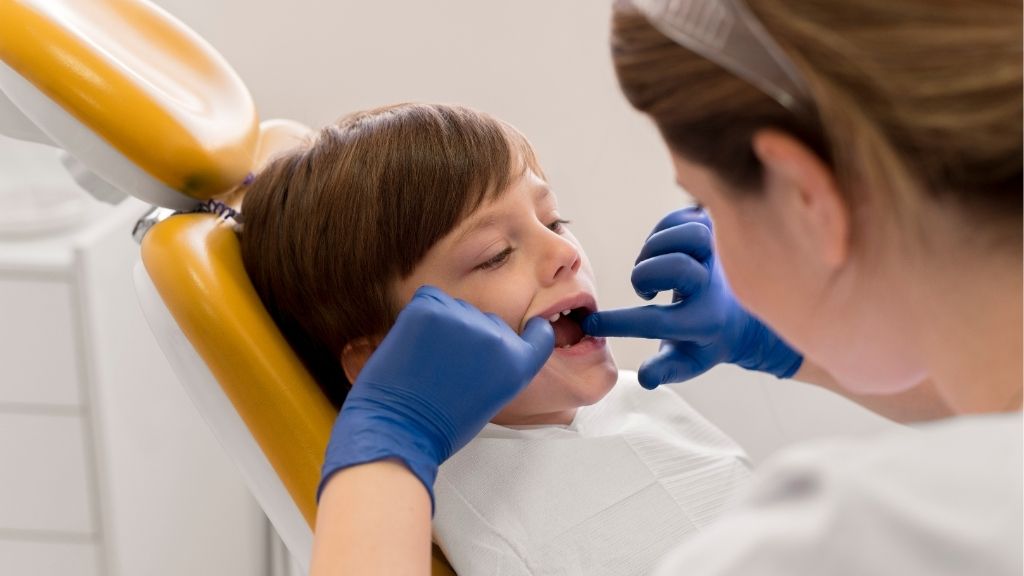Cavities can sneak up fast, especially in kids. One day your child might be happily chewing gum or enjoying a snack, and the next they could be holding their cheek in pain.
Tooth decay is one of the most common childhood diseases in the U.S., but the good news is it’s also one of the easiest to manage — if caught early.
Knowing the signs of a cavity can help you get your child treatment before the problem worsens.
This article will guide parents through the top five signs that your child might have a cavity and what steps to take next.
Plus, we’ll share practical tips to help prevent future cavities so your child can keep a strong, healthy smile in our community.
1. Your Child Complains of Tooth Pain
If your child starts saying “my tooth hurts,” it’s important to take it seriously. Toothaches are often the first and most obvious sign of a cavity.
The pain may start dull and come and go, but over time it can worsen, becoming sharp or throbbing.
Younger children might not be able to explain what they’re feeling clearly, instead crying or becoming irritable.
It’s not uncommon for kids to wake up at night because of tooth pain, so if you notice your child rubbing their face or avoiding cold drinks, it’s time to pay attention.
This kind of pain usually happens when your child eats sweet, hot, or cold foods. That’s because the cavity has reached the sensitive dentin layer inside the tooth, which reacts to temperature and sugar.
For Methuen families, keeping a close eye on how your child reacts to foods can be a key early warning sign.
2. Sensitivity to Hot or Cold Foods
Tooth sensitivity is more than just being picky about food. If your child suddenly pulls away from ice cream, refuses a cold drink, or won’t eat warm soup, this might be a sign of a cavity.
The tooth enamel acts like a shield protecting the nerves inside the tooth. When the enamel breaks down, heat and cold can reach the nerves, causing discomfort.
In Methuen, where seasonal changes mean kids enjoy both hot and cold treats throughout the year, this sensitivity is a clue that shouldn’t be ignored.
Common triggers include ice cream, popsicles, cold juice, hot chocolate, soup, and sugary cereals. If your child avoids these foods or shows discomfort, it’s worth checking for cavities.
3. Visible Spots or Holes in Teeth
Regularly inspecting your child’s teeth during brushing time can help you spot cavities early.
Cavities often appear as brown or black spots, white patches that don’t brush away, or small holes and pits on the teeth, especially in the grooves of molars or between teeth.
In Methuen, where many kids enjoy sugary snacks, these spots may develop quickly if left untreated.
Cavities are caused by bacteria that produce acid after feeding on sugar.
This acid eats away the enamel, creating a hole that can get bigger over time and eventually reach the nerve.
If ignored, treatment can become more complicated and painful. But if caught early, a simple filling can fix the problem.
4. Persistent Bad Breath
Every child gets morning breath, but if your child in Methuen has bad breath that won’t go away—even after brushing—that could be a sign of a cavity.
This ongoing bad breath, known as halitosis, is caused by bacteria building up in the mouth, especially in areas where cavities are forming.
Bacteria feed on leftover food stuck between teeth or in small pits and release acids and gases that create a bad smell.
If your child’s breath remains unpleasant despite good brushing and mouthwash use, it’s time to see a dentist.
Persistent bad breath can also indicate gum problems, which a local pediatric dentist in Methuen can check for during an exam.
5. Changes in Brushing or Chewing Habits
If your child suddenly avoids brushing or refuses their favorite foods, it could be a sign they are hiding tooth pain.
Some kids are afraid to admit they have a toothache because they don’t want to visit the dentist.
Others might not understand what’s happening in their mouth and avoid chewing or brushing on one side.
You might notice your child brushing only one side, rushing through brushing, skipping it altogether, or chewing only on one side of the mouth.
These changes can be subtle but important clues for Methuen parents. Don’t ignore sudden shifts in habits — gently ask your child if something hurts or feels different.
What to Do Next: Seeking Help in Methuen, MA

If you spot any of these signs, the best next step is to schedule a visit with a pediatric dentist in Methuen.
Pediatric dentists specialise in children’s dental care and know how to make kids feel comfortable and safe. They use kid-friendly tools and explain treatments in simple ways to ease fear.
During the visit, the dentist will conduct a full exam, take X-rays if needed, and discuss your child’s pain and habits.
If a cavity is found, they might suggest a filling or, in more serious cases, a crown or nerve treatment.
Early intervention helps prevent bigger problems and keeps dental visits easier for your child.
At-Home Care Tips for Methuen Families
Until your child’s dental visit, you can help manage discomfort by brushing their teeth gently but thoroughly twice a day using fluoride toothpaste in a pea-sized amount.
Limit sugary drinks and sticky snacks common in homes, and encourage cold water if your child experiences swelling or pain.
Flossing once daily is also important. Making brushing fun with music or rewards can motivate kids to keep good habits.
Preventing Cavities in the Future
Good oral hygiene starts at home. Teach your child to brush for two minutes twice a day and floss daily, especially after meals.
If your child is under 8 years old, supervise or assist them with brushing.
Limit sugary foods and drinks such as juice, soda, candy, fruit snacks, and sweet cereals, which are all popular in many Methuen households.
Instead, offer healthy snacks like cheese, yogurt, vegetables, and whole fruits.
When your child does have sweets, try to serve them with meals rather than as separate snacks, as saliva produced during meals helps wash away sugars and acids.
Also, ask your dentist about fluoride treatments and dental sealants. Fluoride strengthens enamel, and sealants protect the chewing surfaces of back teeth where cavities often form.
These preventive measures are quick and painless and provide long-lasting protection.
Conclusion
For families in Methuen, MA, cavities don’t have to be a source of worry or pain.
The earlier you spot the signs — like tooth pain, sensitivity, visible spots, bad breath, or changes in habits — the easier it is to treat and prevent more serious problems.
Regular dental visits, consistent brushing, and healthy eating habits are the best ways to protect your child’s smile now and into the future.
If you notice any signs of cavities, don’t wait — book an appointment with a pediatric dentist in Methuen to keep your child’s smile healthy and bright.
Sources:
- https://www.hopkinsmedicine.org/health/conditions-and-diseases/tooth-decay-caries-or-cavities-in-children
- https://www.mayoclinic.org/diseases-conditions/cavities/symptoms-causes/syc-20352892
- https://www.healthline.com/health/dental-and-oral-health/toddler-cavities
- https://www.nidcr.nih.gov/health-info/tooth-decay/more-info/tooth-decay-process








